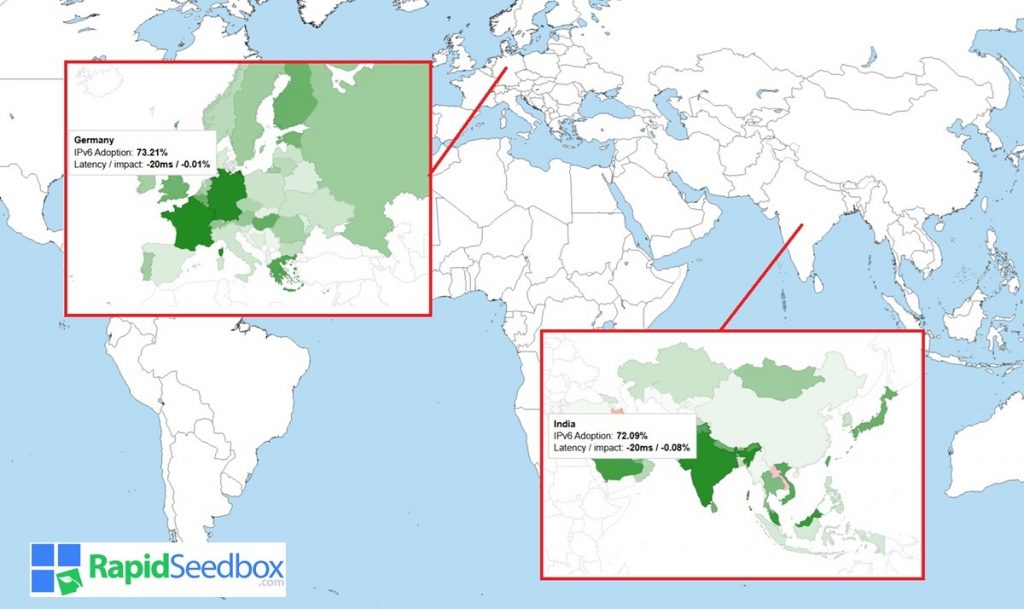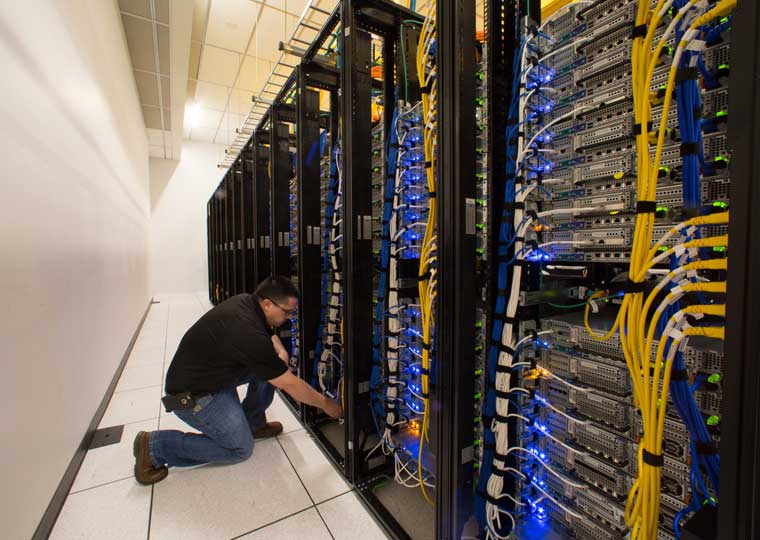Despite its increasing presence, many still find IPv6 somewhat confusing or irrelevant to their everyday lives. For the average netizen, technical terms like these are often hidden behind their devices’ seamless web connectivity, leading some to wonder who uses IPv6.
Beneath the surface of everyday internet usage, IPv6 addresses play a critical role in supporting the modern web. To clear the confusion, this article highlights some entities focusing on the shift to IPv6.
Table of Contents
- Who Uses IPv6?
- Governments and Public Sector Adoption
- Large Tech Companies
- Internet Service Providers
- Mobile Carriers and Telecom Industry
- Educational and Research Institutions
- IPv6 in IoT and Emerging Technologies
- Final Thoughts
Note: RapidSeedbox is a leading authority on IPv6. To help companies learn more about IPv6 and transition models, we’ve published “IPv6: Shaping The Future of The Internet” on Amazon.
1. Who Uses IPv6?
The entities using IPv6 range from government institutions and large enterprises to Internet Service Providers (ISPs) and mobile carriers. Each has compelling reasons to move to IPv6, often centered on scalability, security, and cost.
Google reports that as of September 2024, over 40% of global traffic now runs on IPv6, with some countries experiencing even higher rates. However, IPv6 adoption trends vary globally, with certain regions leading the charge.
Significant users of IPv6 include:
- Governments and Public Sector Companies
- Large Tech Companies
- Internet Service Providers
- Mobile Carriers and Telecom Industry
- Educational and Research Institutions
2. Governments and Public Sector Adoption
Governments and public-sector organizations are key players in the global transition to IPv6. As the internet becomes integral to public services, national security, and digital infrastructure, the shift to IPv6 is essential for these sectors.
The U.S. government has been an early adopter of IPv6, implementing policies that require federal agencies to transition to the new protocol. China has also looked toward IPv6 adoption, driven by the central government’s positioning as a leader in next-generation technologies.
Countries leading IPv6 adoption include:
- India (71.94%)
- France (74.3%)
- Germany (73.37%)
3. Large Tech Companies
Many prominent companies, especially in the tech industry, have been at the forefront of IPv6 adoption. These companies deliver services to billions of people, manage enormous amounts of data, and connect many devices.
Google, Amazon, Microsoft, and many others manage complex global services that support everything from search engines to cloud services.
Examples of leading tech companies in IPv6 adoption include:
- Facebook (Meta) was one of the earliest adopters of IPv6, fully transitioning its infrastructure to the protocol by 2014.
- Apple has been a strong proponent of IPv6, particularly for iOS. It requires all apps on the App Store to be compatible with IPv6-only networks.
- Amazon Web Services (AWS) is one of the largest cloud providers globally, and IPv6 is a critical part of its infrastructure.
Need IPv6 Addresses for Your Growing Business?
Don’t wait for your infrastructure to catch up. With RapidSeedbox’s IPv6 leasing, you can quickly scale your network without the hassle of managing your IP blocks. IPv6 leasing is fast, easy, and designed to help smaller companies thrive.
Get immediate access to IPv6 addresses now!
4. Internet Service Providers
As the demand for internet access continues to rise, Internet Service Providers (ISPs) have faced increasing pressure to transition to IPv6. This transition is essential for maintaining network efficiency, meeting customer expectations, and supporting next-gen digital services.
Network operators, including those managing backbone and transit networks, are also crucial to the success of IPv6 deployment. These operators handle the large-scale infrastructure that connects different ISPs and internet regions.
- Comcast (United States) was an early adopter of IPv6. It began its transition early and has now made IPv6 available to almost all its residential and business customers.
- As a relatively new ISP, Reliance Jio (India) was able to design its network from the ground up with IPv6 in mind.
- Deutsche Telekom (Germany) has enabled IPv6 across its networks in Germany and other European markets.
5. Mobile Carriers and Telecom Industry
The telecom industry, especially mobile carriers, has increasingly turned to IPv6 to ensure their networks can handle the future needs of customers and the broader digital ecosystem. The deployment of IPv6 is essential for supporting the required scale and performance.
For example, the rollout of 5G networks is heavily dependent on IPv6. 5G promises ultra-low latency, high-speed connectivity, and support for massive Internet of Things (IoT) deployments, but these are only feasible with IPv6’s vast address space and enhanced routing capabilities.
Leading Mobile Carriers Adopting IPv6 include:
- T-Mobile (United States) was one of the first U.S. carriers to embrace IPv6 across its entire mobile network. It began the transition as early as 2012.
- SK Telecom (South Korea) integrated IPv6 as part of its 5G rollout, enabling more efficient connections and better support for IoT devices.
- Vodafone (Global) has rolled out IPv6 across many of its European and global markets, preparing its networks for the future of mobile connectivity.
6. Educational and Research Institutions
Universities, research labs, and other educational networks often need to connect diverse devices, including computers, scientific instruments, and IoT systems. This has made IPv6 an upgrade necessary to keep pace with their expanding digital needs.
In addition to addressing scalability issues, IPv6 offers enhanced security features for protecting sensitive academic and research data. These measures benefit those who handle personal information, intellectual property, or classified research.
Some leading adopters in this sector include:
- Internet2 (United States) has been an early advocate of IPv6, integrating it into its backbone network to support large-scale data transfers and cutting-edge research projects.
- CERN (Switzerland) has implemented IPv6 to ensure its network can handle high data volumes and support secure, seamless access for researchers worldwide.
- The University of Tokyo (Japan) uses IPv6 to support various academic and research activities, including IoT research and smart campuses.
7. IPv6 in IoT and Emerging Technologies
As the number of IoT devices continues to explode, IPv6’s nearly limitless address space and enhanced routing capabilities have made it a crucial component. With billions of connected devices deployed, IPv4’s limited address pool cannot support the scale required for IoT.
As devices in an IoT ecosystem often need to communicate with each other directly or through the cloud, IPv6’s simplified packet headers allow for faster and more efficient data transmission, reducing latency and improving the performance of connected devices.
Leading companies in IoT driving IPv6 adoption include:
- Cisco (United States) has been a primary IPv6 adopter so its solutions can enable businesses and smart cities to deploy large-scale IoT solutions.
- Bosch (Germany) has integrated IPv6 into its IoT platforms to support its wide range of connected products, ranging from connected home appliances to industrial sensors.
- Ericsson (Sweden) has integrated IPv6 into its solutions to ensure that IoT devices, particularly in automotive, healthcare, and manufacturing, can connect seamlessly.
8. Final Thoughts
Adopting IPv6 is a critical step in the evolution of the Internet and the infrastructure that supports it. Key sectors, from governments and large enterprises to cloud service providers, embrace IPv6 to ensure their networks remain scalable, secure, and efficient.
As more industries, businesses, and governments transition to IPv6, the global network will better handle the increasing demand for internet connectivity. In years to come, IPv6 adoption will continue accelerating, driving the internet forward.
Ready to Future-Proof Your Network with IPv6?
Transitioning to IPv6 doesn’t have to be difficult. With RapidSeedbox’s IPv6 leasing, you can get instant access to a range of IPv6 addresses, ensuring that your business is prepared for the growing demands of connected devices and expanding data needs.



0Comments